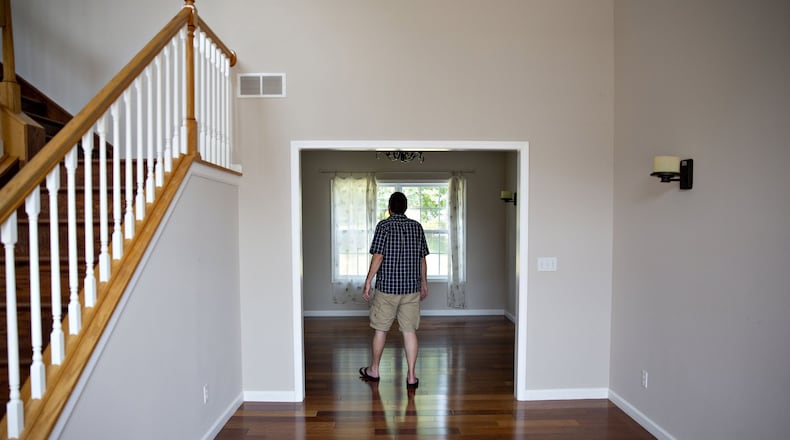After six years of tilting toward sellers, the metro Atlanta housing market may be starting to even out.
Atlanta is definitely not yet a buyer's market, but the trend of ever-greater competition for a shrinking number of properties seems to have peaked, giving local buyers a fighting chance of making a deal, according to a report this week from Re/Max Georgia.
"The kind of market we had before just couldn't last forever and 2018 was the year it started to normalize a little," said John Rainey, Re/Max vice president for Georgia. "I don't think this year will be anything drastic. But I think if you are a seller, it will not be quite as good for you. Homes will not be selling as quickly."
Several patterns seemed to change in 2018, for related reasons.
Perhaps most importantly, the number of homes listed for sale stopped shrinking.
VIDEO: More on this issue
That supply of listings – inventory – has been key to the steady rise in home prices since 2012. At first, the shortage was pegged to the housing collapse in 2007 – a crash that triggered a painful and deep recession.
As the economy improved, the market was flooded with homes for sale – homes that had been foreclosed, new construction that had never been lived in, homes that owners had been waiting for a chance to sell.
Inventory in a healthy market – in which neither buyers nor sellers have the upper hand – should represent six or seven months of sales. But coming out of the recession, that inventory represented nearly on a year’s worth of sales.
That gave buyers the edge.
That advantage evaporated as economy improved and the ratio of listings to buyers fell. By early 2018, inventory was less than two months of sales – an extreme tilt benefiting sellers and pushing up prices.
The result: average prices by mid-2018 were up a resounding 170 percent from early 2012 with much of the surge driven by a shortage of lower-priced homes.
But inventory started ticking up through the rest of last year, hitting four months in November.
That is not a perfect balance, but it’s a lot closer, and it will slow price hikes, said Rainey. “I do believe there will continue to be an increase in prices, but I don’t think it will be the result of bidding wars,” he said.
Average home prices year over year were generally rising at a double-digit pace from 2012 to 2015. Last year, they were up about 8 percent, according to Re/Max data.
But there's another side to the equation: demand.
The "pool" of inventory doesn't drain so fast when there are fewer potential buyers, said Skylar Olsen, director of economic research for Zillow, an online real estate data company. "I would expect that demand will continue to relax. That will make the pool of homes for sale look better. It will look like there are more homes for sale."
Olsen predicts that home values this year will rise only half as fast as last year – something that will help keep homes more affordable.
Atlanta's economy has been strong, the population has been expanding, yet the demand for new homes has not kept pace. Some of that is the result of changing demographics – many of Atlanta's new residents are millennials who either cannot afford to buy homes or simply prefer to rent.
Or both.
Most young people want to buy a home eventually, but only a small fraction think this is the year, said Igor Popov, chief economist for Apartment List, a national apartment listing service. "Millennials lag behind previous generations in homeownership, and 2019 will not be the year that they catch up."
The biggest obstacle to owning for slightly more than half of renters is the challenge of saving enough for a down-payment, according to a recent survey by Trulia, a listing site for renters and buyers.
But Census data shows millennials are not settling down and having children as soon as earlier generations. And many young professionals working jobs in the city of Atlanta say they would prefer to live close to their jobs.
That means more modest demand for houses, which also helps balance the market.
Rainey sees that as portending a good, if unspectacular year.
“Atlanta is one of the healthier real estate markets in the nation,” he said. “I think 2019 will not be a year where we want to pop the cork on a bottle of champagne, but it won’t be a year we’ll jump out of a building either.”
Median sales price, end of year
2018: $234,900
2017: $218,000
2016: $205,794
2015: $192,900
2014: $179,000
2013: $159,000
2012: $126,925
2011: $103,000
2010: $123,400
2009: $140,705
Source: Re/Max
Difference between average list price and sale price
2018: 9.7 percent
2017: 11.0 percent
2016: 8.5 percent
2015: 3.6 percent
2014: 8.2 percent
2013: 7.0 percent
2012: 15.4 percent
2011: 17.6 percent
2010: 13.6 percent
2009: 14.7 percent
Source: Re/Max, staff research
Number of homes for sale in November, metro Atlanta
2018: 23,393
2017: 21,441
2016: 24,012
2015: 25,137
2014: 26,449
2013: 22,580
2012: 22,059
2011: 38,297
2010: 49,654
2009: 51,449
Source: Re/Max
Supply vs. Demand in November: How many months of sales do listings represent?
2018: 4.0 months
2017: 3.0 months
2016: 3.7 months
2015: 4.0 months
2014: 4.8 months
2013: 4.1 months
2012: 3.7 months
2011: 6.7 months
2010: 10.7 months
2009: 11.4 months
Source: Re/Max
About the Author
Keep Reading
The Latest
Featured





